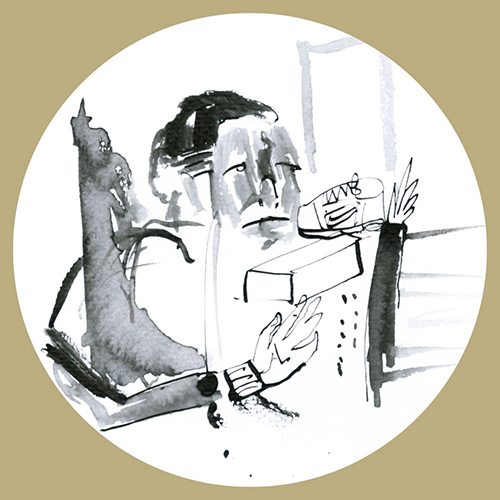Favourites:
April 2021
by Liero Plantir
22/05/2021
![]()
22/05/2021

April went by rather quick, to be honest the whole year is going by a bit too fast. Anyway, here’s some albums, mixes, articles and books I enjoyed.
These are my five favourite albums I’ve listened to in month of April. I wrote some initial thoughts on each one if you’re interested.
Mixes
Djrum London Unlocked @ Tower Bridge
Djrum is actually insane, I can’t get over this set, it’s just so good. His mixing baffles me and the location makes it even more unreal. If you haven’t listened yet I’m not sure what to say.
Djrum is actually insane, I can’t get over this set, it’s just so good. His mixing baffles me and the location makes it even more unreal. If you haven’t listened yet I’m not sure what to say.
Dekmantel Podcast 328 - Wonja
Weird, wild and wonderful. Wonja runs through every kind of sound you can imagine, in the most trippy way possible. It’s full of textures, rhythms and frequencies that will have your mind bouncing as you try and comprehend what you’re listening to.
Weird, wild and wonderful. Wonja runs through every kind of sound you can imagine, in the most trippy way possible. It’s full of textures, rhythms and frequencies that will have your mind bouncing as you try and comprehend what you’re listening to.

rRoxymore @ EOS Radio
This is one of my favourite mixes from the EOS archive. The selection is mind-bending as it runs through genres from IDM, electro and techno which feels so pure and effortless, making it a delight to listen to. This is probably my favourite from the EOS series but I also really love O-Wells February 2021 mix as well.
This is one of my favourite mixes from the EOS archive. The selection is mind-bending as it runs through genres from IDM, electro and techno which feels so pure and effortless, making it a delight to listen to. This is probably my favourite from the EOS series but I also really love O-Wells February 2021 mix as well.
Sofia Ilyas March 2021 @ Balamii
I’m not sure what it is about this mix but it just connects in a way that others don’t. It’s an ode to International Piano Day and covers so much from ambient, classical, jazz and experimental. It sort of takes over your body and transports you into a dreamlike world. It’s such a beautiful selection and I couldn’t recommend anything more highly.
I’m not sure what it is about this mix but it just connects in a way that others don’t. It’s an ode to International Piano Day and covers so much from ambient, classical, jazz and experimental. It sort of takes over your body and transports you into a dreamlike world. It’s such a beautiful selection and I couldn’t recommend anything more highly.
Delayed with... His Master’s Voice
The tag for this mix is #storytelling which is a very fitting summary. I really love mixes that world build in a sort of personal way. I guess it makes you feel closer to the person behind it and what they were trying to convey, even if you interpret it completely differently. It’s always a sort of abstract thing anyway so in a certain setting or mindset the mix can feel vastly different and induce different emotions. I feel as though this mix does exactly that, taking you leftfield through the mind of His Master’s Voice…
The tag for this mix is #storytelling which is a very fitting summary. I really love mixes that world build in a sort of personal way. I guess it makes you feel closer to the person behind it and what they were trying to convey, even if you interpret it completely differently. It’s always a sort of abstract thing anyway so in a certain setting or mindset the mix can feel vastly different and induce different emotions. I feel as though this mix does exactly that, taking you leftfield through the mind of His Master’s Voice…
037: Cleanse
I don’t listen to too much disco but I felt like doing a sort of a feel good mix at some point this month. This mix is the result of that intention and ended up being my favourite one I produced in April. I think it turned out quite well and is one to lift the mood.
I don’t listen to too much disco but I felt like doing a sort of a feel good mix at some point this month. This mix is the result of that intention and ended up being my favourite one I produced in April. I think it turned out quite well and is one to lift the mood.
Articles
Articles
1.
The Lives of Others
Being swapped at birth and then only finding out in middle age, as you can imagine, is probably rather traumatic. This is the story of Clar Hynes and Craig Avery who were swapped at birth and came to find out in a rather coincidental way. Both having been born on the same day in a small town in Newfoundland called Come By Chance, they lived unknowingly that on the day they were born they were sent home with the wrong parents.
As they eventually come to terms with what happened it becomes clear that it was not the only occurrence of baby switching in the Come By Chance Cottage Hospital. This unravels into a story beyond that of Clar and Craig and opens up a floodgate of stories surrounding the same issue.
The Lives of Others is a captivating read as it investigates in depth the coincidental meeting of Clar and Craig and the ongoings in the small town of Come By Chance. The Atavist always has some of the best long-form journalism and this one is no different. I’d also recommend one of their other pieces on the rural outlaw county of Klamath in Oregon.
The Lives of Others
Being swapped at birth and then only finding out in middle age, as you can imagine, is probably rather traumatic. This is the story of Clar Hynes and Craig Avery who were swapped at birth and came to find out in a rather coincidental way. Both having been born on the same day in a small town in Newfoundland called Come By Chance, they lived unknowingly that on the day they were born they were sent home with the wrong parents.
As they eventually come to terms with what happened it becomes clear that it was not the only occurrence of baby switching in the Come By Chance Cottage Hospital. This unravels into a story beyond that of Clar and Craig and opens up a floodgate of stories surrounding the same issue.
The Lives of Others is a captivating read as it investigates in depth the coincidental meeting of Clar and Craig and the ongoings in the small town of Come By Chance. The Atavist always has some of the best long-form journalism and this one is no different. I’d also recommend one of their other pieces on the rural outlaw county of Klamath in Oregon.
2.
The Logic of Stupid Poor People
This may sound like a bit of a demeaning title but it’s an interesting story about presentation, especially in conjunction with race. It’s sort of the idea that everything is signalling, whether you like it or not. In order to benefit you sometimes have to play the game and in the right way.
The Logic of Stupid Poor People
This may sound like a bit of a demeaning title but it’s an interesting story about presentation, especially in conjunction with race. It’s sort of the idea that everything is signalling, whether you like it or not. In order to benefit you sometimes have to play the game and in the right way.
‘You have no idea what you would do if you were poor until you are poor. And not intermittently poor or formerly not-poor, but born poor, expected to be poor and treated by bureaucracies, gatekeepers and well-meaning respectability authorities as inherently poor. Then, and only then, will you understand the relative value of a ridiculous status symbol to someone who intuits that they cannot afford to not have it.’
3.
The Me Effect
This is an interesting little piece focusing on the influence of others on people’s moods. Researchers have called it the ‘trait affective presence’ which is essentially the consistent type of vibe a person gives off. There’s quite a bit of research on the trait affect, which is a person’s habitual feeling state. However, there is much less research into the way others effect this state.
For instance, ‘certain emotions - notably discouragement, frustration and stress - are influenced as much by who you are interacting with as by who you are’. On the other hand positive emotions such as enthusiasm and happiness, are less influenced by others.
Another interesting finding is that a person’s own character traits don’t always predict the emotional effect they have on others as ‘happy people can be downers’.
The research is at its early stage and there’s a lot of interesting avenues to explore in regards to this topic. It’s a fascinating subject to think about and is something that I imagine a lot of people think about implicitly, so it’s nice to have a sort of defined concept for it.
The Me Effect
This is an interesting little piece focusing on the influence of others on people’s moods. Researchers have called it the ‘trait affective presence’ which is essentially the consistent type of vibe a person gives off. There’s quite a bit of research on the trait affect, which is a person’s habitual feeling state. However, there is much less research into the way others effect this state.
For instance, ‘certain emotions - notably discouragement, frustration and stress - are influenced as much by who you are interacting with as by who you are’. On the other hand positive emotions such as enthusiasm and happiness, are less influenced by others.
Another interesting finding is that a person’s own character traits don’t always predict the emotional effect they have on others as ‘happy people can be downers’.
The research is at its early stage and there’s a lot of interesting avenues to explore in regards to this topic. It’s a fascinating subject to think about and is something that I imagine a lot of people think about implicitly, so it’s nice to have a sort of defined concept for it.
4.
Mundia and Modia - The two worlds in which we live
This is probably my favourite article I read this month. Mundia and Modia refer to two worlds. Mundia being the world of immutable laws, e.g. gravity, electromagnetism, supply and demand etc. Modia, on the other hand, is the world of social relationships, e.g. love, hate, admiration, envy etc.
Boxenhorn argues that despite us living in both these worlds we are either one or the other, a Mundian or a Modian. ‘Mundians look out at the world and see the natural landscape; Modians, the social landscape’. The fundamental idea comes down to the way in which we problem solve with Mundians using a naturalistic model and Modians using a sociological model.
He breaks down some specific examples in the piece such as the anthropogenic global warming debate, political leanings and the foundations of various human institutions. For instance, ‘all human institutions tend to become Modian over time...the more subjective the criteria for success, the more Modian the organisation will become. This includes institutions such as government, academia, or the nonprofit sector.
Boxenhorn also makes the observation that this framework explains why people tend towards conservatism with age. We are all born Modians, knowing nothing about the world, but trusting our parents to inform us. However, as we move away from the orbit of our parents we eventually become more knowledgeable about immutable laws as we learn things that contradict what we thought we knew, and have to reconsider our ideas and this pushes us forwards.
This doesn’t happen in Modia because opinions are always changing and intellectual fashions go in and out of style.
It’s definitely an interesting framework to consider and although I’m sure there’s a lot of holes to be poked in it, on a macro level it does serve as an explanation to the things Boxenhorn references, so I’d highly recommend you take a read.
Mundia and Modia - The two worlds in which we live
This is probably my favourite article I read this month. Mundia and Modia refer to two worlds. Mundia being the world of immutable laws, e.g. gravity, electromagnetism, supply and demand etc. Modia, on the other hand, is the world of social relationships, e.g. love, hate, admiration, envy etc.
Boxenhorn argues that despite us living in both these worlds we are either one or the other, a Mundian or a Modian. ‘Mundians look out at the world and see the natural landscape; Modians, the social landscape’. The fundamental idea comes down to the way in which we problem solve with Mundians using a naturalistic model and Modians using a sociological model.
He breaks down some specific examples in the piece such as the anthropogenic global warming debate, political leanings and the foundations of various human institutions. For instance, ‘all human institutions tend to become Modian over time...the more subjective the criteria for success, the more Modian the organisation will become. This includes institutions such as government, academia, or the nonprofit sector.
Boxenhorn also makes the observation that this framework explains why people tend towards conservatism with age. We are all born Modians, knowing nothing about the world, but trusting our parents to inform us. However, as we move away from the orbit of our parents we eventually become more knowledgeable about immutable laws as we learn things that contradict what we thought we knew, and have to reconsider our ideas and this pushes us forwards.
This doesn’t happen in Modia because opinions are always changing and intellectual fashions go in and out of style.
‘To a Modian, it seems natural to keep up with the latest fashion, and they are instinctively swept along. But a Mundian soon becomes disillusioned; the world is supposed to be immutable! When our personal experiences of the world contradict its social messages, Mundians rebel. And so, they gradually move to the right.’
It’s definitely an interesting framework to consider and although I’m sure there’s a lot of holes to be poked in it, on a macro level it does serve as an explanation to the things Boxenhorn references, so I’d highly recommend you take a read.
5.
Game of Thrones - A Girardian Reading
It’s hard for me not to share a well-written piece about Girard’s work. Wang’s short essay basically just aligns the story of Game of Thrones to Girard’s main body of work. It goes through a variety of examples, however I’m sure there’s an endless amount of examples that could be used.
His first example argues that the Targaryens ruled for so long because of external mediation, and the subsequent power struggle occurred because the external mediation broke down. This is due to the Targaryens being a race distinct from most of Westeros and because they held so much power (controlling dragons etc.) there wasn’t really any chance of the other houses succeeding in rebellion. However, as they assimilated over the years, losing their religion and dragons, they became much more like everyone else and so they no longer acted as external mediators.
Moreover, Wang identifies the conflict as Shakespearean, not Marxist. This relates to the point that despite there being otherworldly creatures in the show, such as dragons and zombies, the show doesn’t focus on them explicitly, rather it’s mostly about people fighting with one another. Disturbance isn’t really caused too much by these creatures as people are more obsessed with fighting others like themselves. ‘Wars aren’t fought to defeat collective, existential threats. Instead they’re fought to avenge honor, or sometimes for political or territorial gains. It’s Montagues vs. Capulets, not the huddled masses vs. capitalists.’
There are more examples that Wang gives such as winter as a mimetic crisis, Jon Snow as Jesus and a whole range of instances of mimetic desire at play. If you’ve seen the show and are relatively familiar with Girard’s work it’s quite a fun read. It’s always a fun exercise to identify where Girard’s work appears in pop culture.
Game of Thrones - A Girardian Reading
It’s hard for me not to share a well-written piece about Girard’s work. Wang’s short essay basically just aligns the story of Game of Thrones to Girard’s main body of work. It goes through a variety of examples, however I’m sure there’s an endless amount of examples that could be used.
His first example argues that the Targaryens ruled for so long because of external mediation, and the subsequent power struggle occurred because the external mediation broke down. This is due to the Targaryens being a race distinct from most of Westeros and because they held so much power (controlling dragons etc.) there wasn’t really any chance of the other houses succeeding in rebellion. However, as they assimilated over the years, losing their religion and dragons, they became much more like everyone else and so they no longer acted as external mediators.
Moreover, Wang identifies the conflict as Shakespearean, not Marxist. This relates to the point that despite there being otherworldly creatures in the show, such as dragons and zombies, the show doesn’t focus on them explicitly, rather it’s mostly about people fighting with one another. Disturbance isn’t really caused too much by these creatures as people are more obsessed with fighting others like themselves. ‘Wars aren’t fought to defeat collective, existential threats. Instead they’re fought to avenge honor, or sometimes for political or territorial gains. It’s Montagues vs. Capulets, not the huddled masses vs. capitalists.’
There are more examples that Wang gives such as winter as a mimetic crisis, Jon Snow as Jesus and a whole range of instances of mimetic desire at play. If you’ve seen the show and are relatively familiar with Girard’s work it’s quite a fun read. It’s always a fun exercise to identify where Girard’s work appears in pop culture.
A slow month of reading with an even slower book.





